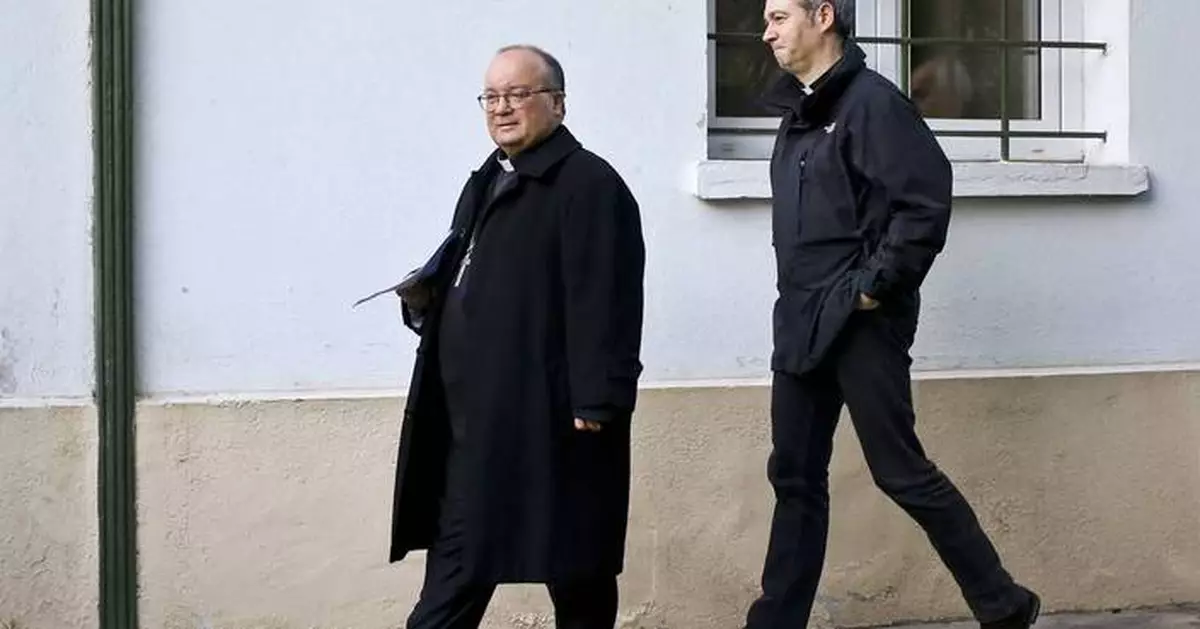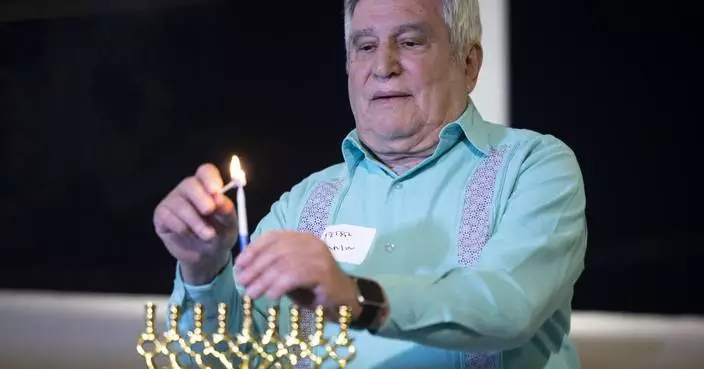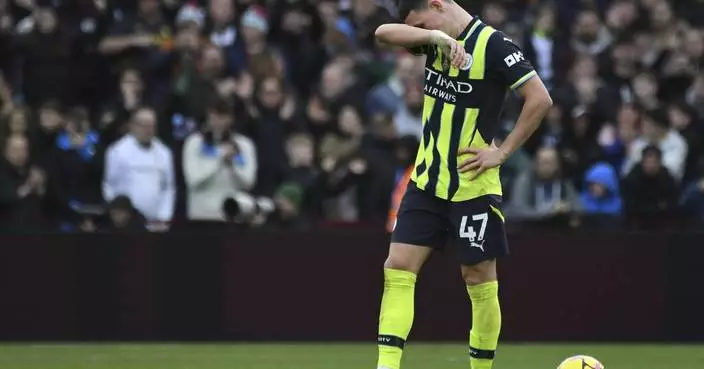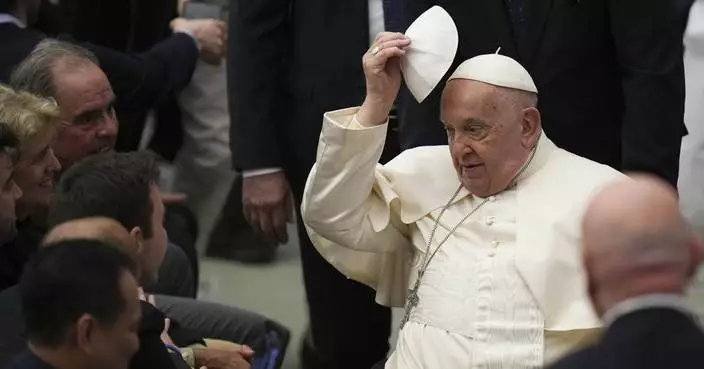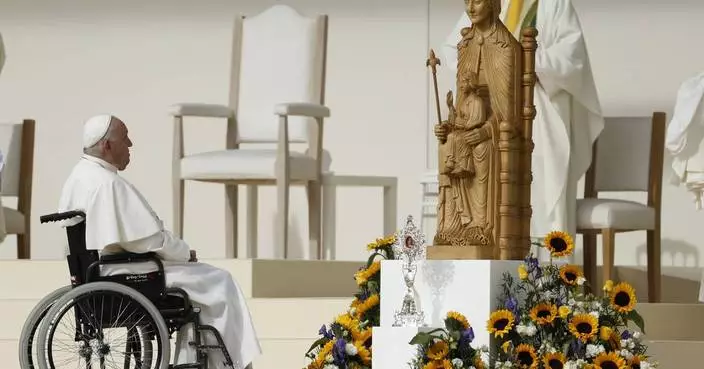ROME (AP) — The Vatican on Wednesday expelled the founder of an influential Peruvian religious movement, the Sodalitium Christianae Vitae, after the Catholic hierarchy spent more than a decade of downplaying allegations of sexual and psychological abuse and financial corruption against him and his community.
The decree against Luis Fernando Figari came after Pope Francis last year ordered an investigation into the Sodalitium by the Vatican’s top sex abuse experts to get to the bottom of the scandal. Previous commissions and investigations had failed to fully address the group's problems.
According to the decree by the Vatican's department for religious orders, which was posted on the website of the Peruvian bishops conference, Francis gave his explicit authorization to expel Figari from the movement, even though canon law didn’t precisely cover his alleged misconduct.
Figari's behavior was “incompatible and therefore unacceptable in a member of a church institution, as well as causing scandal and serious damage to the good of the church and of the individual members of the faithful,” it said. The expulsion would restore justice harmed by Figari’s behavior “over many years, and would protect in the future the individual good of the faithful and the church,” it said.
Figari founded the movement in 1971 as a lay community to recruit “soldiers for God,” one of several Catholic societies born as a conservative reaction to the left-leaning liberation theology movement that swept through Latin America, starting in the 1960s. At its height, the group counted about 20,000 members across South America and the United States. It was enormously influential in Peru.
Victims of Figari’s abuse complained to the Lima archdiocese in 2011, though other claims against him reportedly date to 2000. But neither the local church nor the Holy See took concrete action until one of the victims, Pedro Salinas, wrote a book along with journalist Paola Ugaz detailing the twisted practices of the Sodalitium in 2015, entitled "Half Monks, Half Soldiers.”
The Sodalitium later commissioned an outside investigation that found Figari was “narcissistic, paranoid, demeaning, vulgar, vindictive, manipulative, racist, sexist, elitist and obsessed with sexual issues and the sexual orientation" of Sodalitium's members.
The outside investigation, published in 2017, found that Figari sodomized his recruits and forced them to fondle him and one another. He liked to watch them “experience pain, discomfort and fear,” and humiliated them in front of others to enhance his control over them, the report found.
Still, the Holy See declined to expel Figari from the movement in 2017 and merely ordered him to live apart from the Sodalitium community in Rome and cease all contact with it. The Vatican was seemingly tied in knots by canon law that did not foresee such punishments for founders of religious communities who weren't priests. At the time Salinas called it a “golden exile.”
On Wednesday, Salinas called Figari's definitive expulsion good news.
“I hope it is the beginning of more important news that will culminate in the suppression of this mafia-like sect,” he told The Associated Press.
It remains unclear if any more decisions about the Sodalitium, which controls significant economic interests, would follow.
However, the expulsion puts into question the very foundation and continued existence of the Sodalitium, since such religious movements are always tightly bound to their founder and his or her original inspiration for the movement.
The Sodalitium, for its part, distanced itself from Figari in a statement Wednesday, welcoming the decision to expel him and saying it had wanted him expelled back in 2019. The group insisted it was undergoing a renewal process that will allow it to continue without Figari or his influence.
“Figari is the historical founder of the Sodalitium Christianae Vitae, but he is not a spiritual reference for our community,” the current superior, José David Correa González, said in a statement. “We want to continue to work so that this gift may be at the service of the evangelizing mission of the church.”
Such a sentiment is similar to the one espoused by the Legion of Christ religious order. The Vatican in 2010 opted to put the Mexican order through a Vatican-mandated process of reform rather than suppressing it after determining that its founder, the Rev. Marcial Maciel, was a pedophile, drug addict and religious fraud who built a cult-like movement to hide his double life.
Figari's expulsion is the second personnel step by Francis after the Vatican's abuse investigators — the Rev. Jordi Bertomeu and Archbishop Charles Scicluna — returned from Peru last year. In April, Francis accepted the resignation of a Peruvian archbishop and Sodalitium member, Piura Archbishop José Eguren, who had sued Salinas and Ugaz over their reports about the Sodalitium.
In addition to Figari’s own abuses, their reporting had exposed the alleged forced eviction of peasants on lands in Eguren’s diocese by a Sodalitium-linked real estate developer.
In comments to AP, Ugaz called the decision to expel Figari of “paramount importance” since it exposed how the Peruvian church — with a few exceptions — “did nothing to listen to the victims who have been denouncing the Sodalitium since 2000.”
She said it was also a validation of journalism “and perhaps it will serve to give reparations to their victims.”
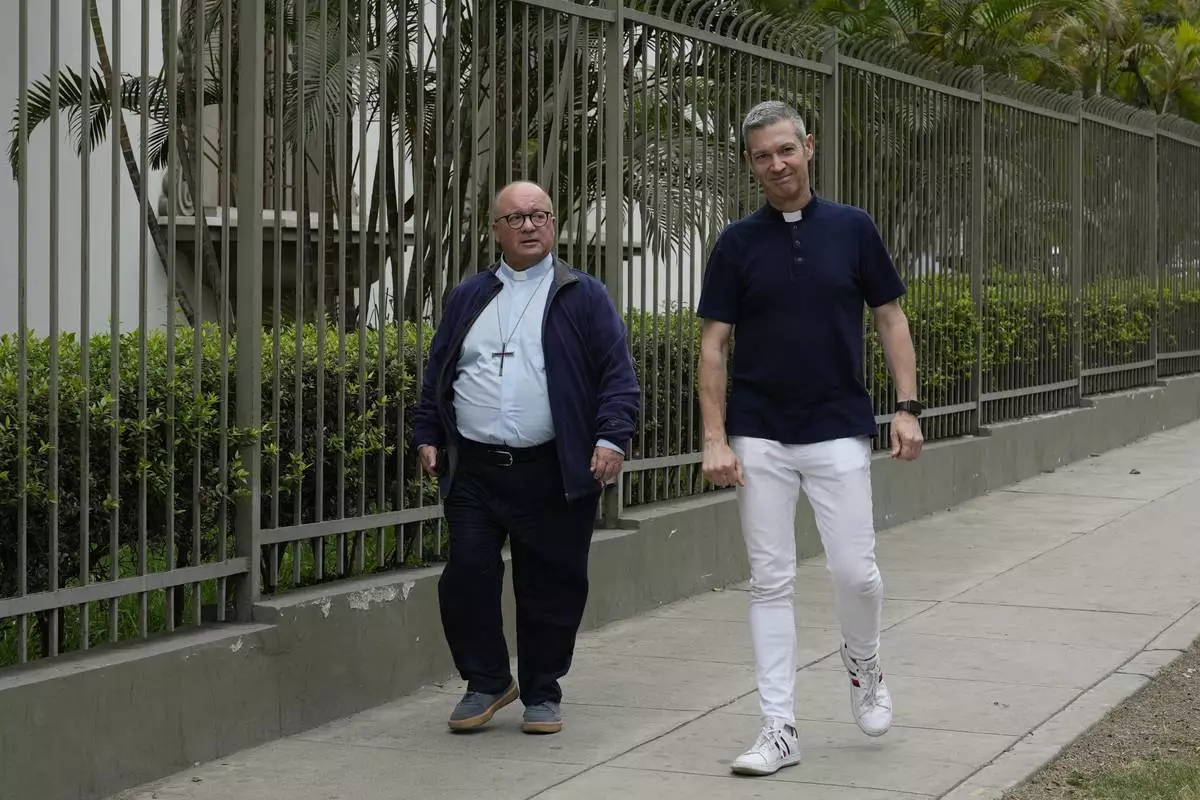
FILE - Vatican investigators Monsignor Jordi Bertomeu, right, from Spain, and Archbishop Charles Scicluna, from Malta, walk outside of the Nunciatura Apostolica during a break from meeting with people who alleged abuse by the Catholic lay group Sodalitium Christianae Vitae in Lima, Peru, on July 25, 2023. (AP Photo/Martin Mejia, File)
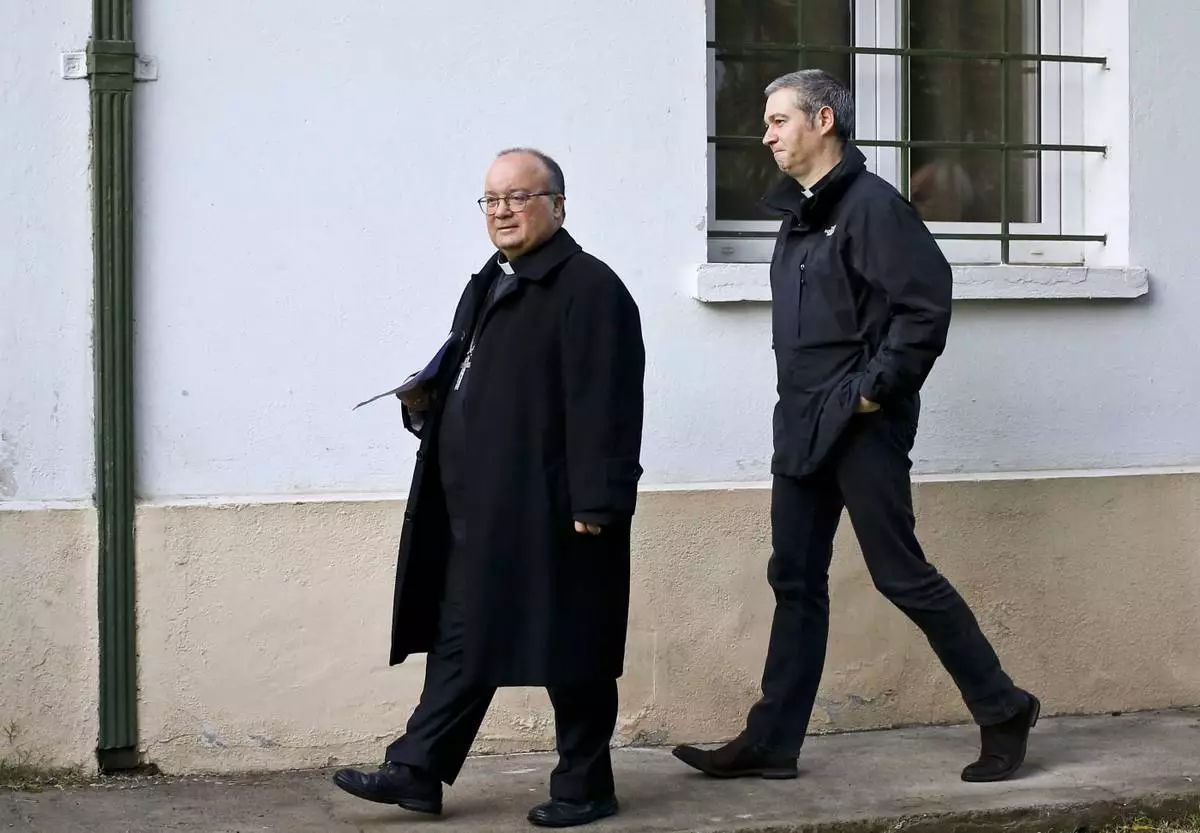
FILE - Archbishop Charles Scicluna, left, and Spanish Monsignor Jordi Bertomeu, right, walk to a press conference in Santiago, Chile, on June 19, 2018. (AP Photo/Esteban Felix, File)
Hanukkah, Judaism’s eight-day Festival of Lights, begins this year on Christmas Day, which has only happened four times since 1900.
For some rabbis, the intersection of the two religious holidays provides an auspicious occasion for interfaith engagement.
“This can be a profound opportunity for learning and collaboration and togetherness,” said Rabbi Josh Stanton, a vice president of the Jewish Federations of North America. He oversees interfaith initiatives involving the 146 local and regional Jewish federations that his organization represents.
“The goal is not proselytizing; it's learning deeply from each other,” he said. “It’s others seeing you as you see yourself.”
One example of togetherness: a Chicanukah party hosted Thursday evening by several Jewish organizations in Houston, bringing together members of the city’s Latino and Jewish communities for a “cross cultural holiday celebration." The venue: Houston’s Holocaust museum.
The food on offer was a blend of the two cultures — for example a latke bar featuring guacamole, chili con queso and pico de gallo, as well as applesauce and sour cream. The doughnut-like pastries were sufganiyot — a Hanukkah specialty — and buñuelos, And the mariachi band took a crack at playing the Jewish folk song “Hava Nagila.”
“What really brings us together is our shared values — our faith, our families, our heritage,” said Erica Winsor, public affairs officer for the Jewish Federation of Greater Houston.
Rabbi Peter Tarlow, executive director of the Houston-based Center for Latino-Jewish Relations, said the first Chicanukah event 12 years ago drew 20 people, while this year the crowd numbered about 300, and could have been larger had not attendance been capped. He said the party-goers were a roughly even mix of Latinos — some of them Jews with Latin American origins — and “Anglo” Jews.
“There’s too much hate, too much separation against both Jews and Latinos,” Tarlow said. “This is a way we can come together and show we support each other.”
While Hanukkah is intended as an upbeat, celebratory holiday, rabbis note that it’s taking place this year amid continuing conflicts involving Israeli forces in the Middle East, and apprehension over widespread incidents of antisemitism.
Rabbi Moshe Hauer, executive vice president of the Orthodox Union, acknowledged that many Jews may be feeling anxious heading into Hanukkah this year. But he voiced confidence that most would maintain the key tradition: the lighting of candles on menorah candelabras and displaying where they’re visible through household windows and in public spaces.
“The posture of our community — without stridency, just with determination — is that the menorah should be in our windows, in a place where the public sees it,” Hauer said.
“It is less for us, the Jewish community, than for the world,” he added. “We have to share that light. Putting the menorah in the window is our expression of working to be a light among the nations.”
Hauer concurred with Stanton that this year’s overlap of Hanukkah and Christmas is “an exceptional opportunity to see and experience the diversity of America and the diversity of its communities of faith.”
Rabbi Motti Seligson, public relations director for the Hasidic movement Chabad-Lubavitch, noted that this year marks the 50th anniversary of a milestone in the public lightings of menorahs. It was on Dec. 8, 1974 — as part of an initiative launched by the Lubavitcher leader, Rabbi Menachem M. Schneerson — that a menorah was lit outside Philadelphia’s Independence Hall, where the Liberty Bell was housed at the time.
"Hanukkah is a celebration of religious liberty, so that it’s not taken for granted,” Seligson said. “One of the ways of doing that is by celebrating it publicly.”
He said Chabad was organizing about 15,000 public menorah lightings this year through its numerous branches around the world.
“There certainly is some apprehension,” Seligson said, referring to concerns about antisemitism and political friction. “Some people question whether Jews will be celebrating as openly as in the past.”
“What I’m hearing is there’s no way that we can’t,” he added. “The only way through these difficult times is by standing stronger and prouder and shining brighter than ever.”
Stanton concurred.
“Through our history, we’ve been through moments that are easy and moments that are hard,” he said. “Safety for us does not come from hiding. It comes from reaching out.”
Why is Hanukkah so late this year? The simple answer is that the Jewish calendar is based on lunar cycles, and is not in sync with the Gregorian calendar which sets Christmas on Dec. 25. Hanukkah always begins on the 25th day of the Jewish month of Kislev, a date which occurs between late November and late December on the Gregorian calendar.
The last time Hanukkah began on Christmas Day was in 2005. But the term “Chrismukkah” — signifying the overlap of the two holidays — had become a popular term before then. The term gained extra currency in 2003, when the character Seth Cohen on the TV drama “The O.C.” embraced the fusion holiday as a tribute to his Jewish father and Protestant mother.
This season, the Hallmark Channel introduced a new Christmas movie called “Leah’s Perfect Gift,” depicting a young Jewish woman who had admired Christmas from a distance, and gets a chance to experience it up close when her boyfriend invites her to spend the holidays with his family. Spoiler alert: All does not go smoothly.
Despite such storylines suggesting a fascination with Christmas among some Jews, Stanton says research by the Jewish Federations reveals a surge in Jews seeking deeper connections to their own traditions and community, as well as a surge in Jews volunteering for charitable activities during the holidays.
Associated Press religion coverage receives support through the AP’s collaboration with The Conversation US, with funding from Lilly Endowment Inc. The AP is solely responsible for this content.
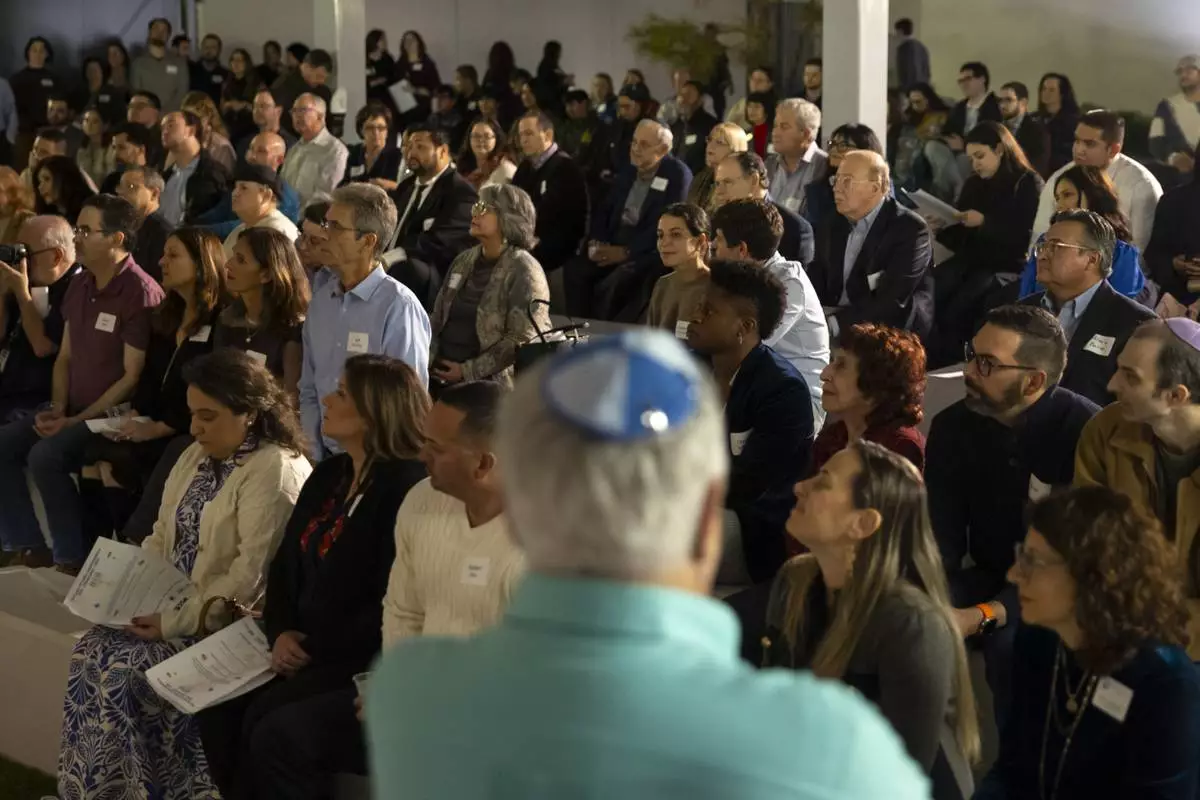
Guests listen to speakers during a Chicanukah event at Holocaust Museum Houston on Thursday, December 19, 2024, in Houston. (AP Photo/Annie Mulligan)
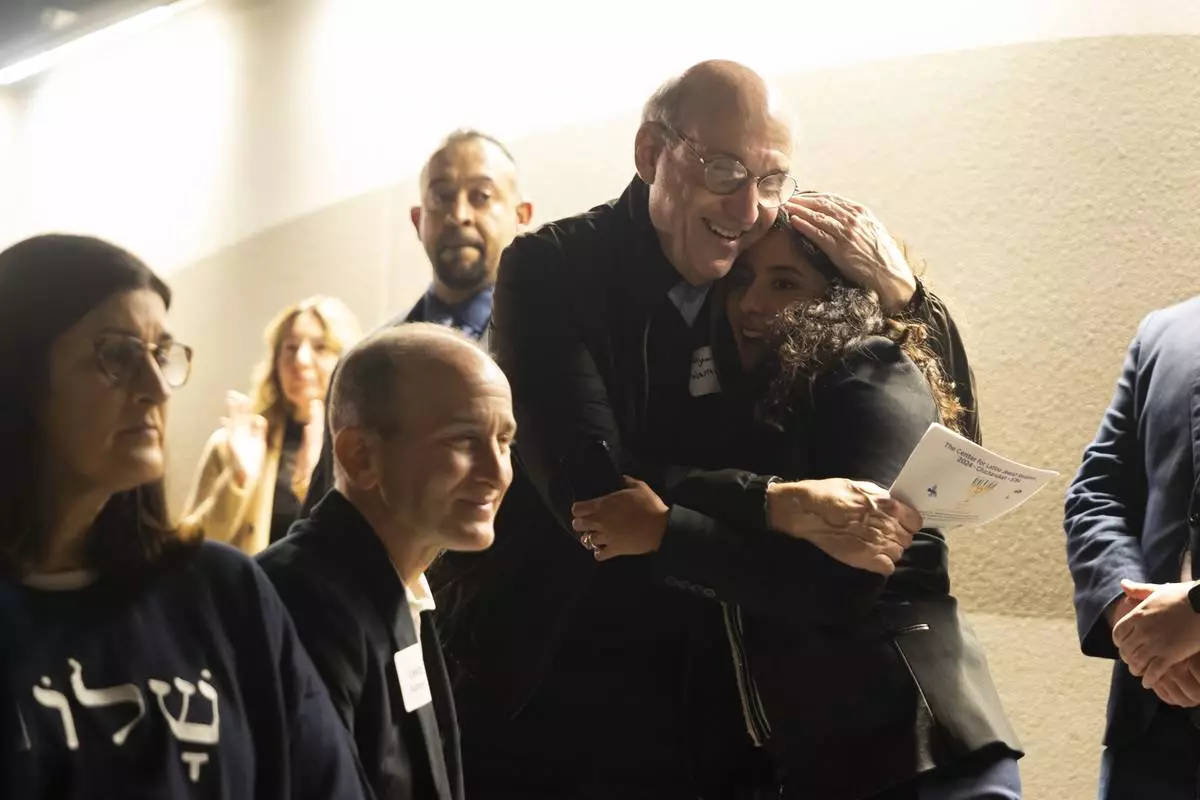
Benjamin Warren hugs Harris County Judge Lina Hidalgo after she spoke during a Chicanukah event at Holocaust Museum Houston on Thursday, December 19, 2024, in Houston. (AP Photo/Annie Mulligan)
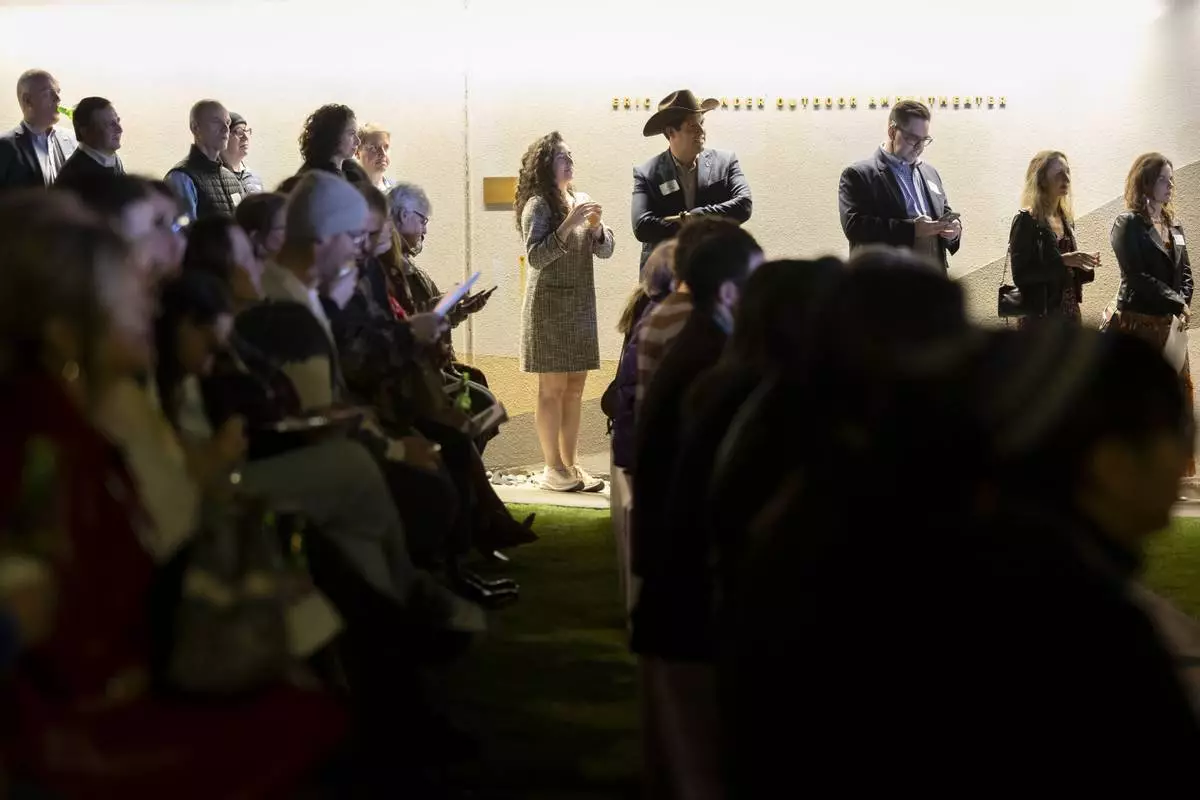
Attendees listen to speakers during a Chicanukah event at Holocaust Museum Houston on Thursday, December 19, 2024, in Houston. (AP Photo/Annie Mulligan)
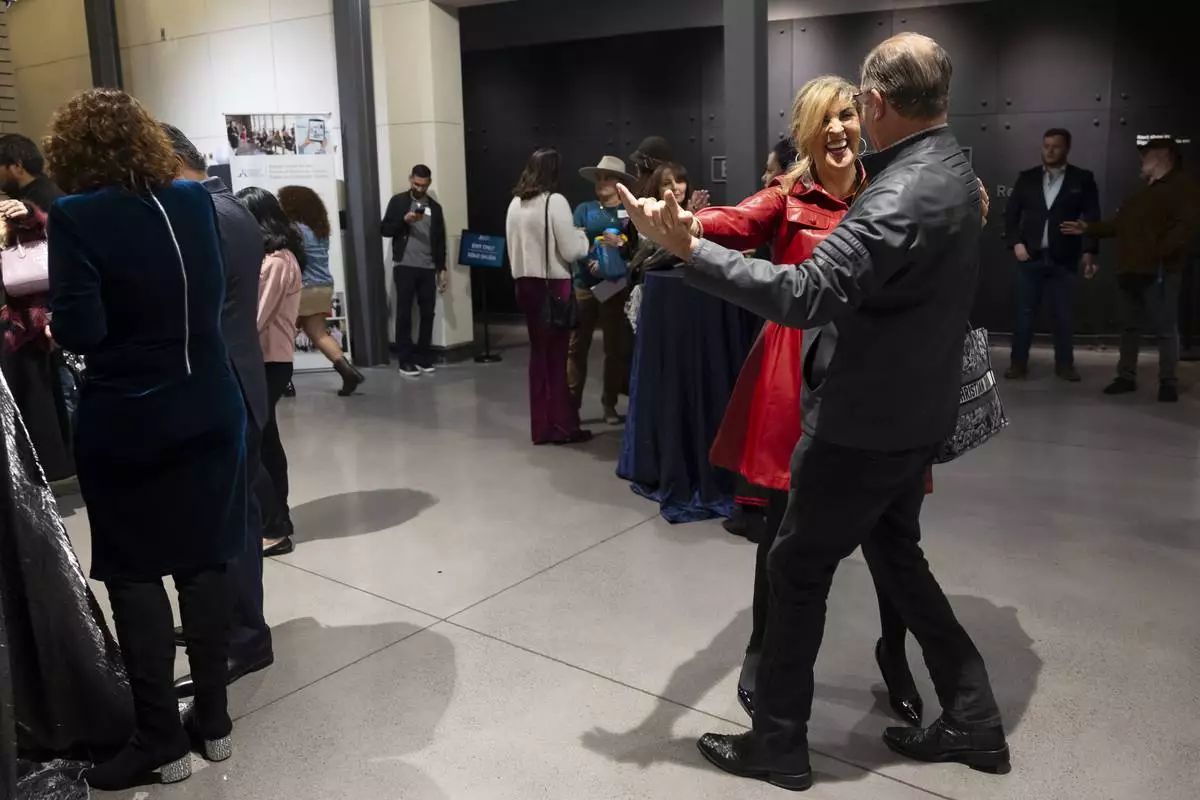
Dr. Annette Goldberg dances with Sheldon Weisfeld during a Chicanukah mariachi performance at Holocaust Museum Houston on Thursday, December 19, 2024, in Houston. (AP Photo/Annie Mulligan)
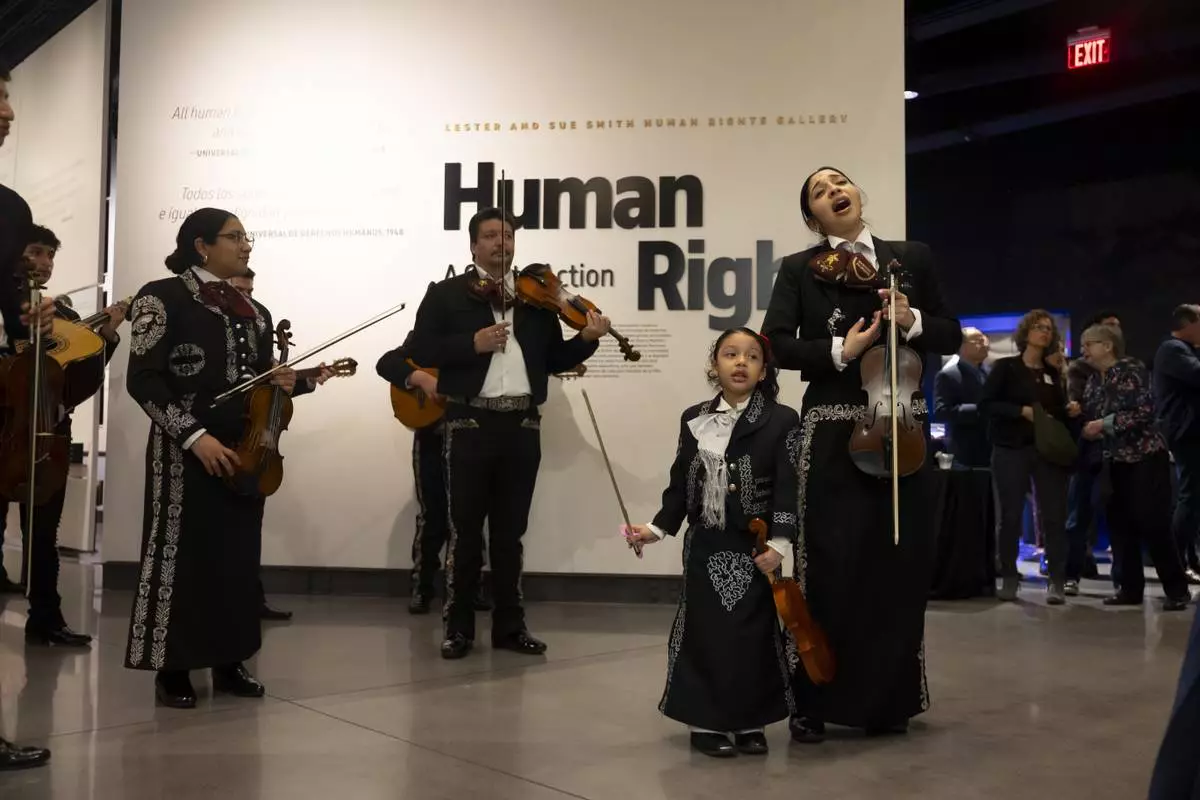
Altagracia Vazquez performs with her daughter Ariana, 6, and Mariachi Palmeros during a Chicanukah event at Holocaust Museum Houston on Thursday, December 19, 2024, in Houston. (AP Photo/Annie Mulligan)
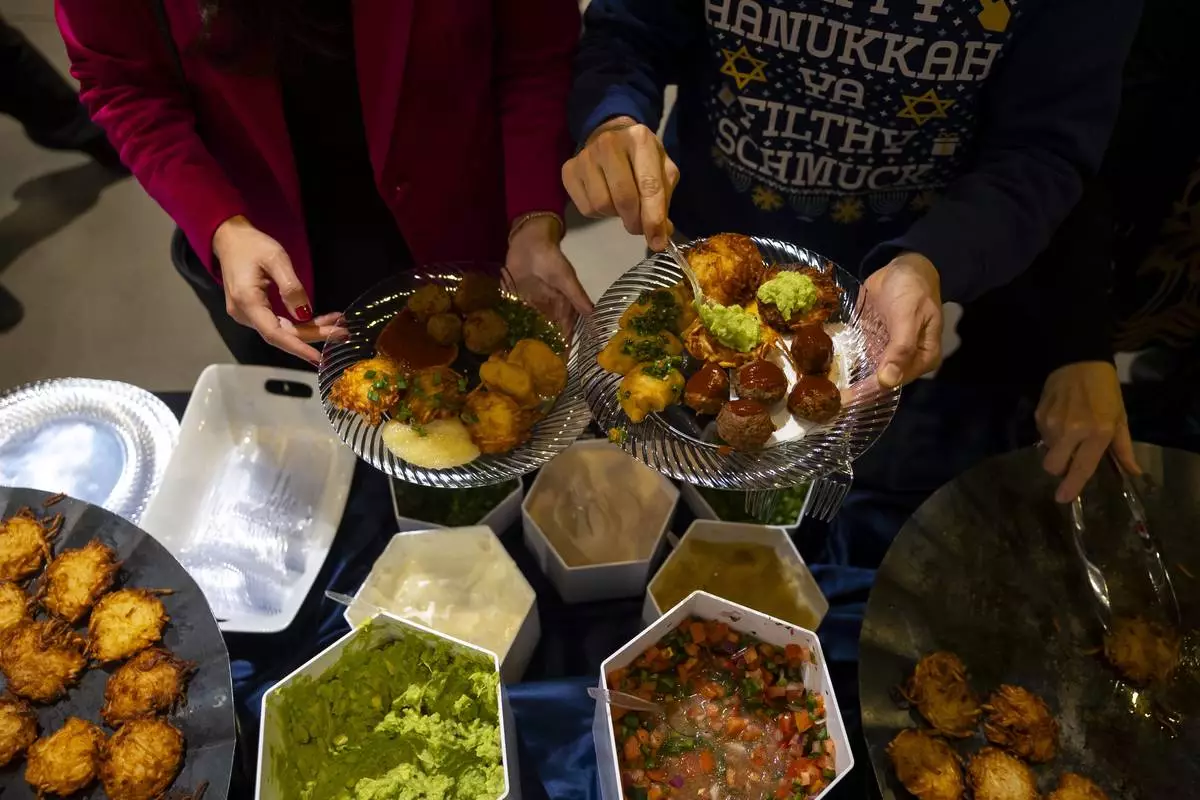
Guests add guacamole and pico de gallo to latkes during a Chicanukah event at Holocaust Museum Houston on Thursday, December 19, 2024, in Houston. (AP Photo/Annie Mulligan)
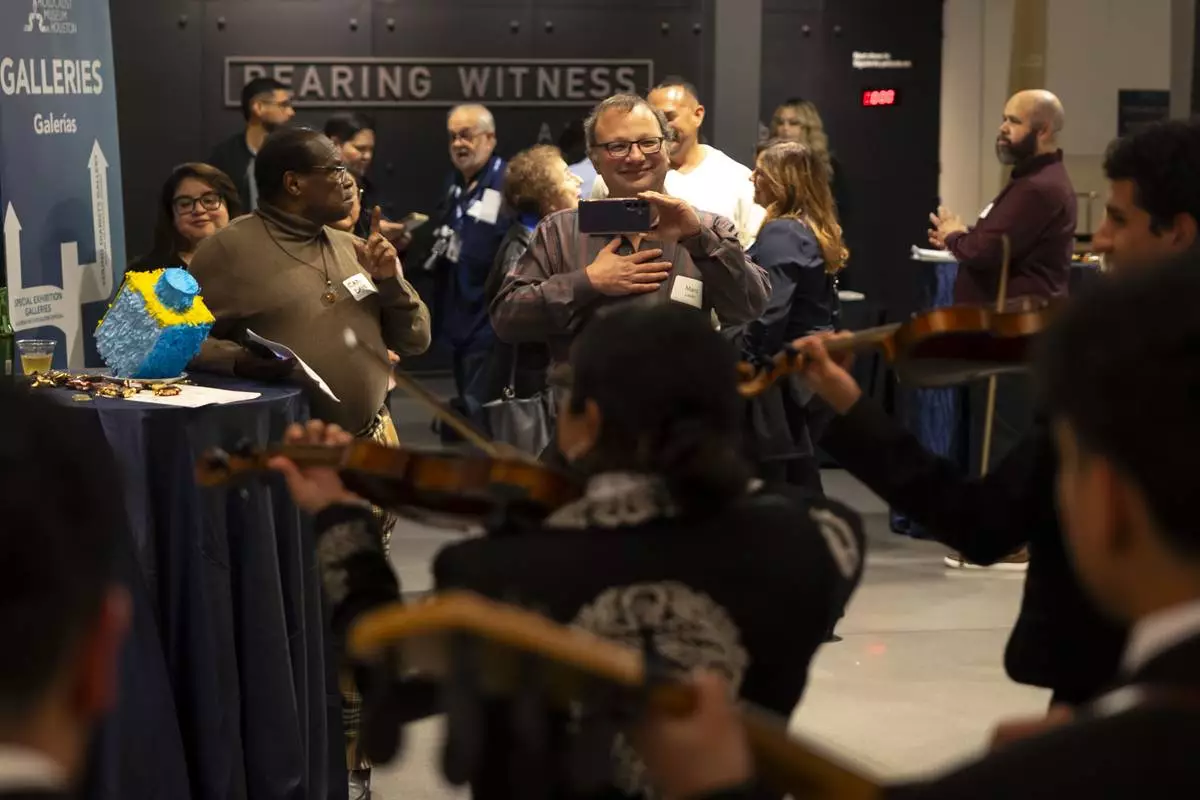
Guests enjoy a performance by Mariachi Palmeros during a Chicanukah event at Holocaust Museum Houston on Thursday, Dec. 19, 2024, in Houston. (AP Photo/Annie Mulligan)
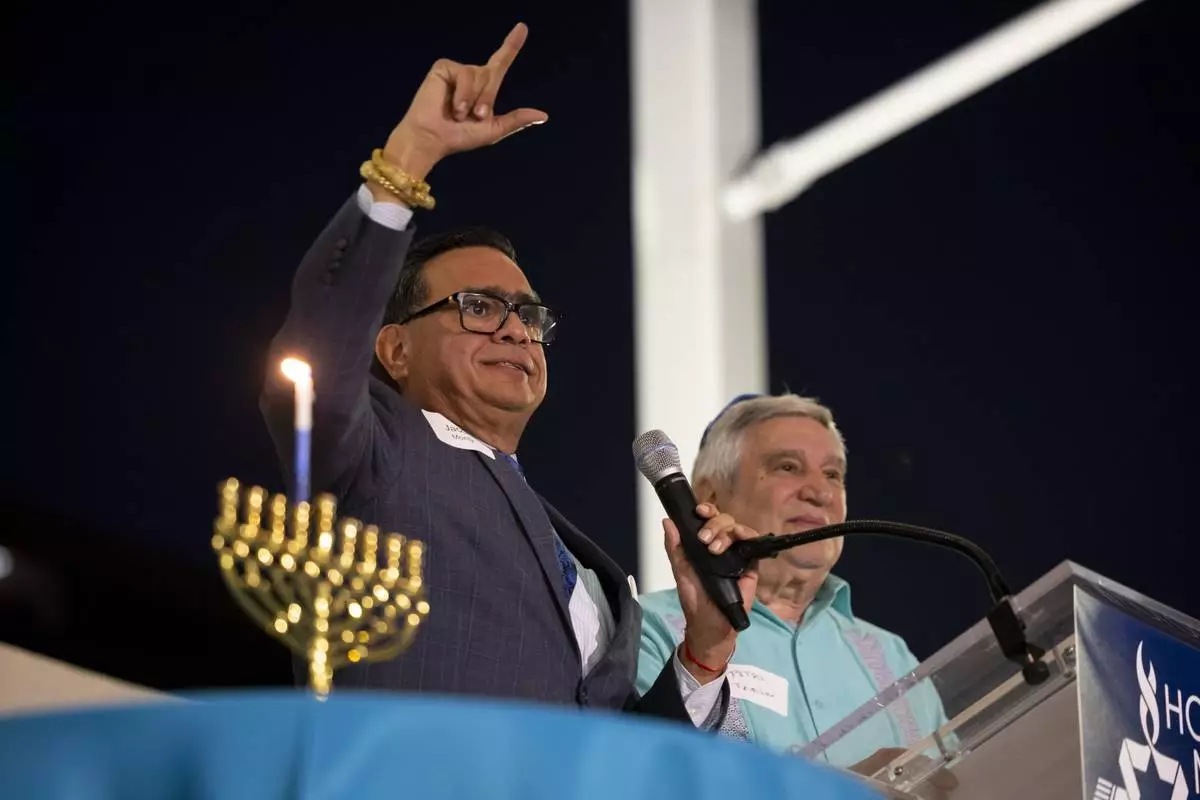
Jacob Monty joins Rabbi Peter Tarlow at the podium during a Chicanukah event at Holocaust Museum Houston on Thursday, Dec. 19, 2024, in Houston. (AP Photo/Annie Mulligan)
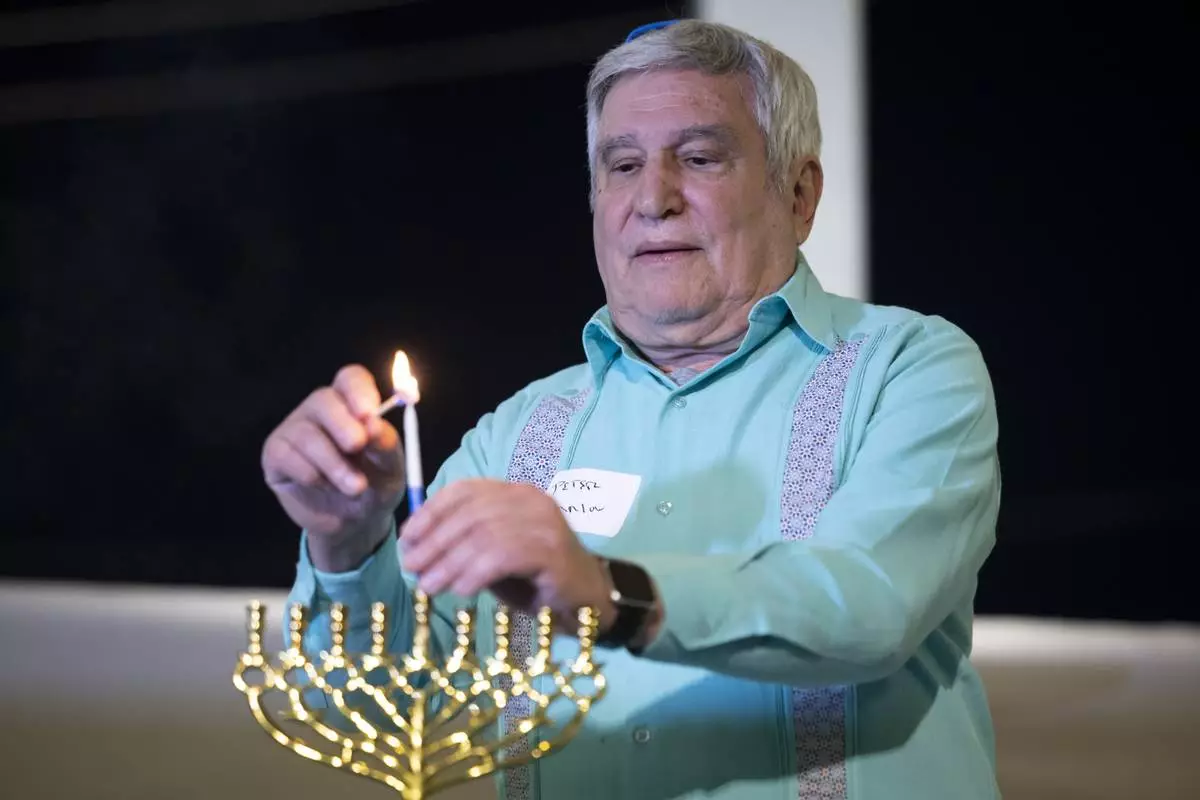
Rabbi Peter Tarlow lights a candle on a menorah during a Chicanukah event at Holocaust Museum Houston on Thursday, Dec. 19, 2024, in Houston. (AP Photo/Annie Mulligan)
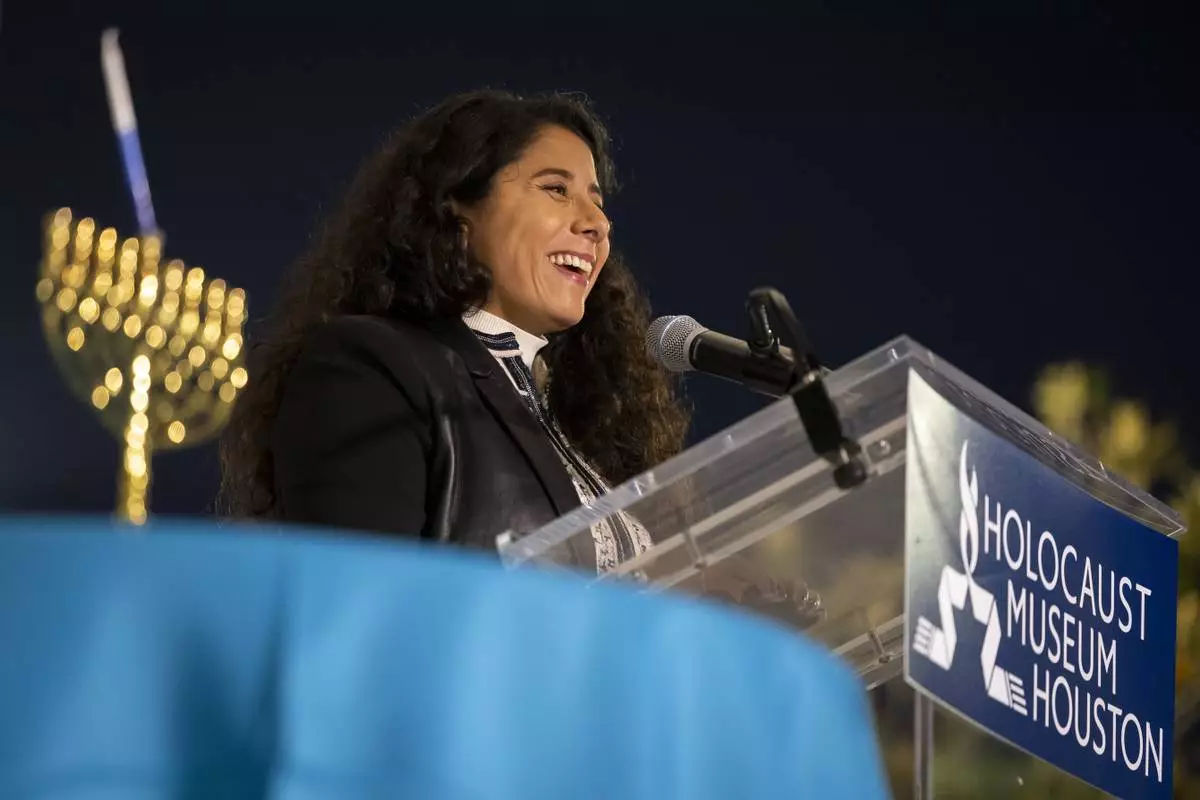
Harris County Judge Lina Hidalgo speaks during a Chicanukah event at Holocaust Museum Houston on Thursday, December 19, 2024, in Houston. (AP Photo/Annie Mulligan)




